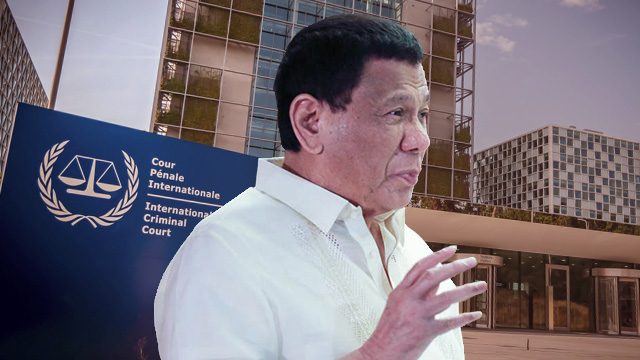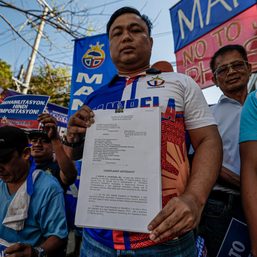SUMMARY
This is AI generated summarization, which may have errors. For context, always refer to the full article.

The petitions questioning President Rodrigo Duterte’s unilateral withdrawal from the International Criminal Court (ICC) might have failed, but the decision keeps not only the ICC case against the drug war killings alive, but also affects it “positively,” said international law expert Andre Palacios.
“I think it affects it positively. I know the decision is to dismiss and the withdrawal is valid under Philippine law, but as stated in the Court decision, acts which occurred prior to withdrawal, which is March 15, 2019, are within the jurisdiction of the Court and can be the subject of an investigation, and in fact the issuance of warrants of arrest,” Palacios said in the Rappler podcast Law of Duterte Land.
Palacios teaches Public International Law (PIL) at the University of the Philippines (UP) College of Law, and is the chairman of the Integrated Bar of the Philippines (IBP) international law committee.
The Supreme Court en banc announced in March that it had junked the petitions by a unanimous vote, 15-0, for being moot. The Court released the 101-page decision written by Associate Justice Marvic Leonen only on Wednesday, July 21.
The Supreme Court said the Philippines is still obliged to cooperate with any ICC proceedings, as what the Rome Statute provides, but Duterte’s spokesperson Harry Roque dismissed that part as merely obiter, or an opinion that’s not legally binding. Roque insists Duterte will not cooperate.
Palacios said it’s the citation of Republic Act 9851 or the International Humanitarian Law (IHL) that reinforces the duty to cooperate.
“What is positive with the Court’s decision here is the explanation that the provisions of the Rome statute have been domesticated and also, that the provisions of RA 9851 are stronger than the Rome Statute,” said Palacios.
He added: “RA 9851 has provisions on the Philippines cooperating with international tribunals requesting the arrest and surrender of an individual, so to me it’s still a plus.”
Palacios was referring to Section 17, Chapter 7 of the IHL, which says that Philippine authorities “may surrender or extradite suspected or accused persons in the Philippines to the appropriate international court, if any, or to another State pursuant to the applicable extradition laws and treaties.”
The ICC’s pre-trial chamber has yet to decide whether to authorize an investigation into killings under Duterte’s drug war. In the course of the investigation, ICC prosecutor Karim Khan may request the issuance of warrants of arrest or summons. The implementation of those warrants and summons will depend on the cooperation of Philippine authorities, or authorities in member countries where the person would travel to.
What the SC decision means
The decision of the Supreme Court laid down three rules for withdrawing treaties, all of which give presidents “much leeway,” the Court itself said.
The Court said the president cannot unilaterally withdraw a treaty if it had congressional imprimatur, or if the Senate has expressly declared that its concurrence is needed.
Palacios said that’s still “very important because it reclarifies the respective powers of the branches of government with regard to foreign policy.”
The Supreme Court said the president can still withdraw a treaty even without a court saying the treaty is illegal. While that gives leeway to the president, Palacios said the decision still imposed a limitation on presidential power.
“Previously the idea is that the president is the sole architect of foreign policy with unlimited powers, so now it’s clarified that the power is shared and the power is limited, and very detailed limitations,” said Palacios.
The Supreme Court had, in the past, dismissed politically-charged petitions based on mootness, or lack of legal standing, such as the ABS-CBN petitions against a shutdown and the same-sex marriage petition. In the case of the humanitarian release of prisoners, the Supreme Court did a remand which was slammed as being too late and almost irrelevant.
It puts expectations on the Supreme Court to be more active when it comes to civil liberties, especially under Duterte.
“Parties who probably have tried to avail of the judicial system and have been disappointed would say that more needs to be done, and we have to have a second option of going to the international court. That’s understandable,” said Palacios.
The Supreme Court also junked the petitions for lack of legal standing, saying there’s no transcendental importance.
While context of the killings “is unavoidable,” Palacios said “in most times, however, the Court would just confine itself on the issues raised.”
“And in this case, the issue was really the legality of the unilateral withdrawal without the Senate concurrence,” said Palacios.
Did the Supreme Court take the easy way out, then?
“I don’t think so, I think the effort of the Court to examine the issues is shown by the length of the decision, and also the quality of the analysis,” said Palacios. – Rappler.com
Add a comment
How does this make you feel?










![[Rappler’s Best] Patricia Evangelista](https://www.rappler.com/tachyon/2024/04/unnamed-9-1.jpg?resize=257%2C257&crop=486px%2C0px%2C1333px%2C1333px)


There are no comments yet. Add your comment to start the conversation.